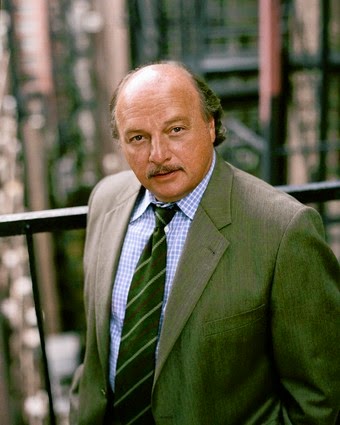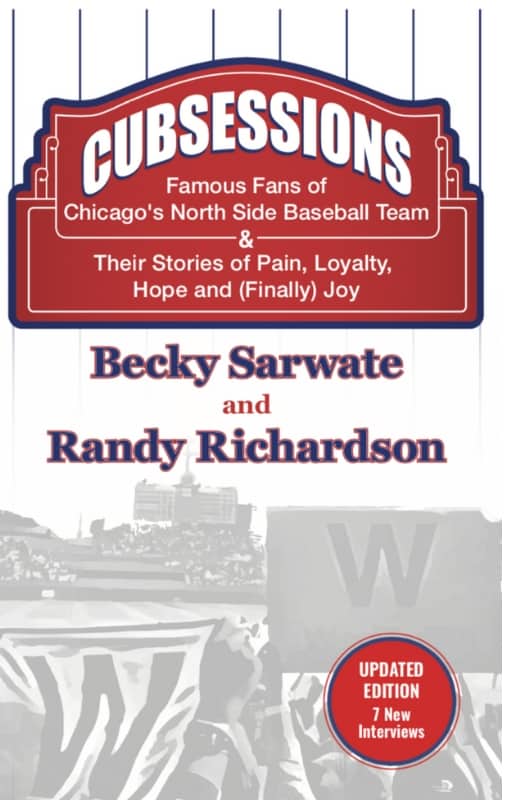Today is Dennis Franz’s birthday, and as a birthday tribute, we’re providing a free excerpt about him from the Eckhartz Press book Cubsessions. Authors Randy Richardson and Becky Sarwate-Maxwell interviewed an A-list of celebrities about their love of the Cubs. This is the chapter about Dennis….

Growing up in Maywood, west of Chicago, in the 1950s, Dennis Franz’s sport was baseball and his team was the Cubs. Not surprisingly, his favorite player was No. 14, Ernie Banks (aka “Mr. Cub”).
“He was my hero,” Franz said in a phone interview. “I grew up trying to bat like him, wiggling my fingers like him…”
Two decades later, Franz was a budding actor in Chicago perfecting his craft in the Organic Theater Company, a repertory theater that had set up shop in the Uptown Center Hull House on Beacon Street. The new company, which also included Joe Mantegna and Meshach Taylor, gained some notoriety in 1974, when it presented the world premiere of Sexual Perversity in Chicago by David Mamet.
Two years later, Mantegna planted the seed for a play about Cub fans. “[Mantegna] would walk by [Wrigley Field] every day and he’d see all these fans spilling out of the stadium,” Franz said, and he thought, ‘There’s got to be some way to bring them into our theater.’”
[Mantegna’s] the one that brought the idea and got us thinking in that direction,” Franz said. “Collectively, we all started talking about it and we decided we’d start going to some of the games to try to find some interesting people. So that was our homework. When we weren’t performing, we’d go to Wrigley and we’d watch the games and look for interesting characters. We came to see this little group in the bleachers that were always there, and they were interesting and fun people and bets were flying around. There was just a lot going on.”
Those real-life characters became the inspiration for Bleacher Bums, which debuted in 1977 under the direction of Stuart Gordon. “We decided it was going to be one game that was representative of the heartbreak that was experienced by the Cubs over the years on a regular basis,” Franz said. “How the hopes get built up and dreams are crashed and still you remain a loyal Cubs fan.”
Bleacher Bums and its themes of hope, futility and – most of all – die-hard loyalty, struck a chord and toured across the country with changing casts that included Dennis Farina, Gary Sandy and George Wendt. A 1979 performance of the play was taped for PBS television, and in 2002, a made-for-TV movie adaptation was produced.
As it turned out, Bums was Franz’s final show with the Organic Theater Company before he hitched up a U-Haul and headed for Hollywood. “I think we all were kind of surprised by the popularity of it,” Franz said. “Quite honestly, I didn’t think it was our best work. But it turned out to be one of the most beloved works that we had done over that five-year period and for those of us who worked on the original production, it certainly has the fondest place in all of our hearts. We just wanted to fill the seats of the theater and it turned into this thing that I think everyone of us is grateful for.”
In Hollywood, Franz gained fame for his tough-but-lovable cop roles, first as Lt. Norman Buntz on Hill Street Blues and later as Detective Andy Sipowicz on NYPD Blue, for which he earned four Emmy Awards for Outstanding Lead Actor in a Drama Series.
Before he landed those star-making roles, Franz played pitching coach Angelo Carbone in Bay City Blues, a short-lived comedy-drama series about a minor league baseball team, the Bay City Bluebirds. Despite an impressive cast that also included then-relative unknowns Michael Nouri, Sharon Stone and Ken Olin, NBC aired only four of the eight episodes that were produced before cancelling the show for low ratings.
But that short-lived series made a lasting impact on Franz as there was also a baseball player extra on the series by the name of Joey Banks, who Franz came to learn is the son of Cubs’ great Ernie Banks, Franz’s boyhood hero. Through that chance connection Franz got to meet the Hall of Fame player he idolized as a kid.
“I got a nice personally-signed autograph from Ernie,” Franz said, “and then I got to meet him several times. Throughout the years, we became sort of semi-friends. He was baseball for me.”
Franz readily admits that for several years, he had not kept up closely with the Cubs. Then in 1998, he was invited to sing “Take Me Out to the Ballgame” at Wrigley Field during the seventh-inning stretch. Into the booth, he brought his three nephews, then between eight and 12 years old, to sing along with him. “That was an unforgettable experience and one that I will forever cherish,” he said. “The opportunity that the Cubs organization gave me – and to bring my nephews with me – that was something that meant the world to them, because I come from a very, very, very Cubs family. They were introduced to the love of Cubs at birth. Their father is a die-hard Cubs fan as the rest of the family is, too. So that was the highlight of their life for them at that time.”
The youngest of those three nephews, Cody Sharko, now works for the Cubs organization in its corporate partnerships division. “To know that this little squirt, who came into the box with me and sang ‘Take Me Out to the Ballgame’ is now working for the love of his life, the Chicago Cubs, and he was given this beautiful commemorative ring – it’s just a story that goes full-circle and it’s so wonderful to see…Through him I’m living vicariously.”
For Franz, the Cubs’ winning the World Series “was a validation of so many years of dreaming a dream and truly in your heart accepting the fact that that dream may never come true.”
“It is something that I didn’t expect to experience in my lifetime,” Franz said. “I thought there’s no way that it was going to happen. It was something that I had loved all my life, and even though I didn’t always follow them over the years, it wasn’t that I had lost that love for them. It’s just that life is long and there are many directions and many roads that it takes you. When you’re young and you’re playing baseball, that’s the center of your world. You become older and all of that changes. But the love and the passion is still inside of you.
“Over all the years, I don’t care where I am or who I’m with, if you asked me who do you like, I would always say ‘I’m a Cubs fan. I always will be.’ So when the dream came true, it was a validation. It was pretty wonderful.”

Leave a Comment